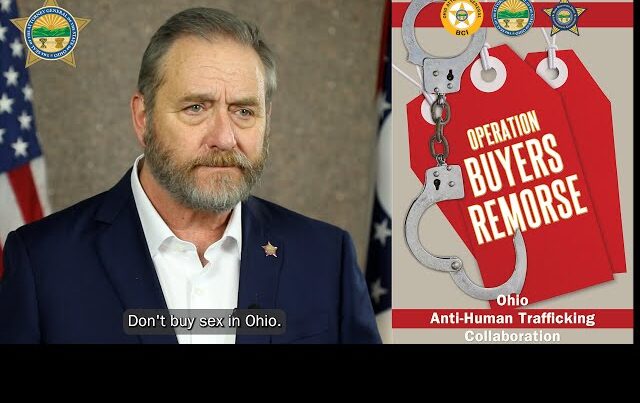Statewide Sting Operation Shows Local Demand for Sex Contributes to One of the Fastest-Growing Criminal Enterprises
Sex buyers contribute to the cycle of exploitation and abuse to meet demand
October 4, 2023
CLEVELAND, OH – The arrests last week of 160 individuals in Ohio for trying to buy sex has illuminated an ugly truth: human trafficking thrives because there’s a high demand, even if buyers unintentionally purchase sex from individuals being trafficked.
Kirsti Mouncey, President & CEO of the Collaborative, which brings together more than 75 organizations to end sex and labor trafficking in Cuyahoga County, said human trafficking will be stopped when there is a focus on prevention and there’s no demand in the illegal and dehumanizing sex trade.
“Even if sex buyers do not knowingly purchase sex from a trafficked individual, they are response for creating the demand that allows sex trafficking to exist,” Mouncey said. “Human trafficking is a serious crime that involves the coercion, threat and force of individuals for the purpose of forced labor or sexual exploitation. While there are instances where individuals knowingly or unknowingly purchase sex from victims of human trafficking, there is always a chance that they are inadvertently supporting this public health crisis.”
Ohio Attorney General Dave Yost on Tuesday announced the success of a weeklong statewide human trafficking crackdown, ‘Operation Buyer’s Remorse,’ which sought to arrest those trying to buy sex and to identify survivors of human trafficking. The Northeast Ohio Human Trafficking Task Force and the Cuyahoga County Sheriff’s Department partnered with the Ohio Attorney General’s Office, Ohio Organized Crime Investigations Commission, local, state, and federal law enforcement partners and community partners in Operation Buyer’s Remorse.
Mouncey said it’s incumbent upon the community to work collectively to combat human trafficking by increasing awareness, education and providing support to victims. “It is essential to address the root causes of human trafficking, provide resources and support for victims, and educate both sex workers and buyers about the signs of exploitation to combat this problem effectively,” she said. “Human trafficking happens here, too, even in what we perceive as affluent and safe communities. Blanket assumptions about the attitudes of all sex buyers can be counterproductive in addressing the complexities of human trafficking.”
Research has shown that certain vulnerabilities make individuals more susceptible to being trafficked. Anywhere from 50 percent to 80 percent of victims of commercial sexual exploitation, including child sex trafficking, are or were formerly involved with the child welfare system. By attacking the root causes that increase the chances of someone becoming a trafficking victim, we can end the cycle of trafficking. People are more susceptible to being trafficked under the following conditions:
- Family involvement in trafficking rings
- Addiction
- Poverty
- Homelessness, including runaways
- A history of abuse and neglect
- LGBTQIA youth
Mouncey said the focus should now turn to helping the survivors, who need safe and supportive environments to share their experiences without judgment or blame. The Collaborative can connect survivors with appropriate support services that can assist them in their healing journey and provide avenues for seeking justice if desired. An interactive resource map of survivor services by community is available on the Collaborative’s website at https://collabtoendht.org/human-trafficking/#helphotlines.
Education and training are available from the Collaborative for any organization that wants to learn more about how to recognize and prevent human trafficking. “Call us,” Mouncey said. “We have free trainings available. We can help.”
Mouncey encouraged the community to visit a thought-provoking art installation new at Public Square in downtown Cleveland titled “Let the Oppressed Go Free.” Artist Timothy Schmalz, whose work is installed at the Vatican and other spots around the world, created this sculpture with its 100 figures symbolizing the faces of human trafficking victims. The installation is sponsored by Cleveland West Foundation and the Collaborative to End Human Trafficking. The installation is at Public Square in downtown Cleveland, free to the public, and runs through March 31.
About the Collaborative
The Collaborative to End Human Trafficking’s mission is to lead, empower, and connect our community to eradicate human trafficking. The Collaborative provides leadership and expertise to empower a systemic, community-wide response to human trafficking, through education, resources, training, and facilitating a multi-disciplinary collaborative. As the backbone organization of a 60+ organization membership program called Greater Cleveland’s Coordinated Response to Human Trafficking, the Collaborative provides strategic leadership to create social change.
# # # # #
Media Contact: Malissa Bodmann, 216-536-7517



